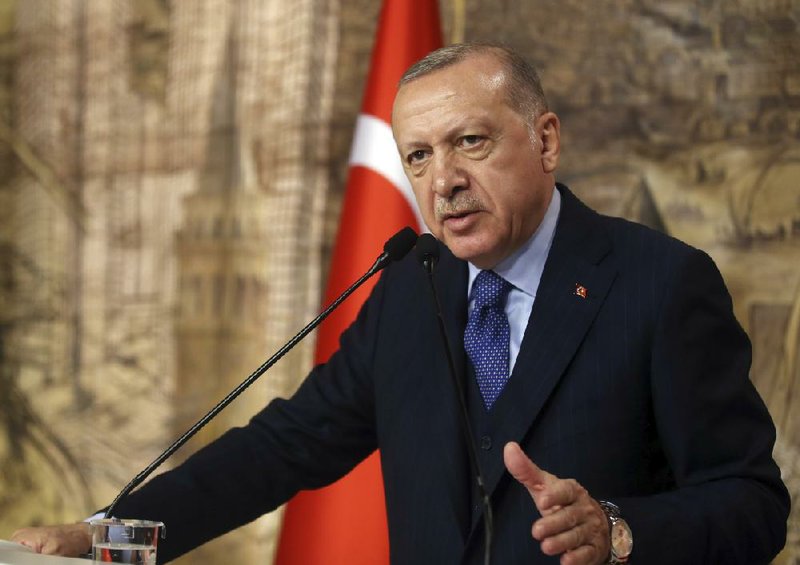ANKARA, Turkey -- Turkish President Recep Tayyip Erdogan said his country's borders with Europe were open Saturday, making good on a long-standing threat to let refugees into the continent as thousands of migrants gathered at the frontier with Greece.
Erdogan's announcement that Turkey is allowing refugees and migrants to exit the country marked a dramatic departure from current policy and an apparent attempt to pressure Europe.
The announcement was made as a military operation in northwestern Syria's Idlib province has forced hundreds of thousands of Syrian civilians to flee fighting between advancing Syrian government forces backed by Russia and rebel fighters supported by Turkey.
The mass displacement in Idlib has raised the possibility that Turkey might face growing international pressure to open its now sealed border with Syria and offer refuge to desperate Syrian civilians.
[Video not showing up above? Click here to watch » https://www.youtube.com/watch?v=HSolKfwvn5M]
"We can't handle a new wave of migration," Erdogan said Saturday, in an apparent reference to the growing humanitarian crisis in Idlib. Nearly 950,000 displaced civilians have been pushed toward the Syrian-Turkish border in the winter weather.
Erdogan said Turkey would not stand in the way of refugees and migrants already in the country who hope to head to Europe.
"We will not close the gates to refugees," he said. "The European Union has to keep its promises. We are not obliged to look after and feed so many refugees."
Under a $6.6 billion deal in 2016, Turkey agreed to stem the tide of refugees to Europe in return for financial aid after more than 1 million people entered Europe in 2015. It has since accused the EU of failing to honor the agreement. Erdogan has frequently threatened to "open the gates" and allow refugees and migrants to head to Europe unless more international support was provided.
[Gallery not loading above? Click here for more photos » arkansasonline.com/31turkey]
The German Foreign Ministry said that it was in contact with other governments regarding the matter and assumed and expected that the EU-Turkey agreement will be adhered to.
Since seizing territory from Kurdish forces in a different part of Syria in October, Erdogan has also suggested resettling at least 1 million Syrian refugees from Turkey in that northeastern region. However, his efforts to secure funding for such a scheme have been rejected by European governments. Aid groups have said it is still too dangerous to return refugees to Syria.
Turkey currently hosts more than 3½ million Syrian refugees, and many others fleeing war and poverty in Asia, Africa and the Middle East use it as a staging post and transit point to reach Europe, usually through neighboring Greece.
Migrants played a cat-and-mouse game with Greek border patrols Friday night through Saturday, with Greek authorities firing tear gas to repulse the crowd's attempts to push through the border. Greek officials said migrants lobbed at least 20 canisters of tear gas toward the border from the Turkish side.
Greek officials arrested 66 migrants Friday, 17 of whom were sentenced to 3½ years in jail for entering the country illegally. All Afghans, they are the first migrants sentenced for illegal entry since 2014. On Saturday, Greece arrested another 70 people who tried to cross the border from Turkey.
Some migrants cut holes in the fence, with a few managing to get through. They took shelter overnight in abandoned buildings or small chapels in the Greek countryside before starting to walk toward northern cities.
Others were crossing from the Turkish coast to nearby Greek islands.
Greece announced that it was sending police and army reinforcements to its land border and reinforcing controls along the sea border, where 52 coast guard and navy vessels were patrolling.
Citizen Protection Minister Michalis Chrisochoidis visited the border and described the situation as "difficult and unpleasant."
"Thousands of unfortunate people are cramming on our border; they have not come here of their own accord," he said. "They are being pushed, repulsed and used by our neighboring country Turkey." The minister insisted no one without legal travel documents would be allowed to cross.
Erdogan's speech Saturday in Istanbul was the first clear announcement that migrants would be allowed to try to cross the border, after a Foreign Ministry spokesman floated the idea Thursday, prompting the first wave of migrants to head to the border.
Civilians are caught in the crossfire as tensions have ratcheted up between Turkey and Syria. More than 55 Turkish troops have been killed since Turkey began sending reinforcements into rebel-held areas of Syria last month. Thousands of Turkish soldiers are deployed inside Syria's Idlib province, which is dominated by al-Qaida-linked militants.
Turkey's Defense Ministry said late Friday that one of its soldiers was killed and two were injured by Syrian government shelling. It was the latest fatality after an airstrike killed 33 troops last week.
Information for this article was contributed by Elena Becatoros and Ayse Wieting of The Associated Press.
A Section on 03/01/2020
